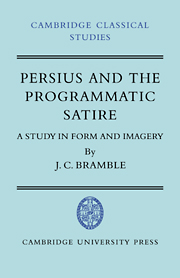nec qui abaco numeros et secto in pulvere metas
scit risisse vafer, multum gaudere paratus
si cynico barbam petulans nonaria vellat.
his mane edictum, post prandia Callirhoen do.
The following translation is based on the rendering by Professor Niall Rudd in The Satires of Horace and Persius published by Penguin Books in 1973:
Ah, the obsessions of men! What an empty world we live in! ‘Who will read this?’
Are you asking me? Why, no one.
‘No one?’
Well, perhaps one or two.
‘Disgraceful! Pathetic!’
But why?
Are you worried in case ‘Polydamas and the Trojan ladies’ prefer Labeo to me? What the hell. If woolly old Rome attaches no weight to a piece of work, don't you step in to correct the faulty tongue on her balance. Ask no one's view but your own. Is there any Roman who hasn't – if only I could say it – but I can, when I look at our venerable hair and that austere demeanour and all we've been at since we gave up marbles and assumed the wisdom of disapproving uncles, then – sorry, I don't want to – I can't help it – it's just my irreverent humour – I guffaw!
Behind our study doors we write in regular metre, or else foot-loose, a prodigious work which will leave the strongest lungs out of breath.
